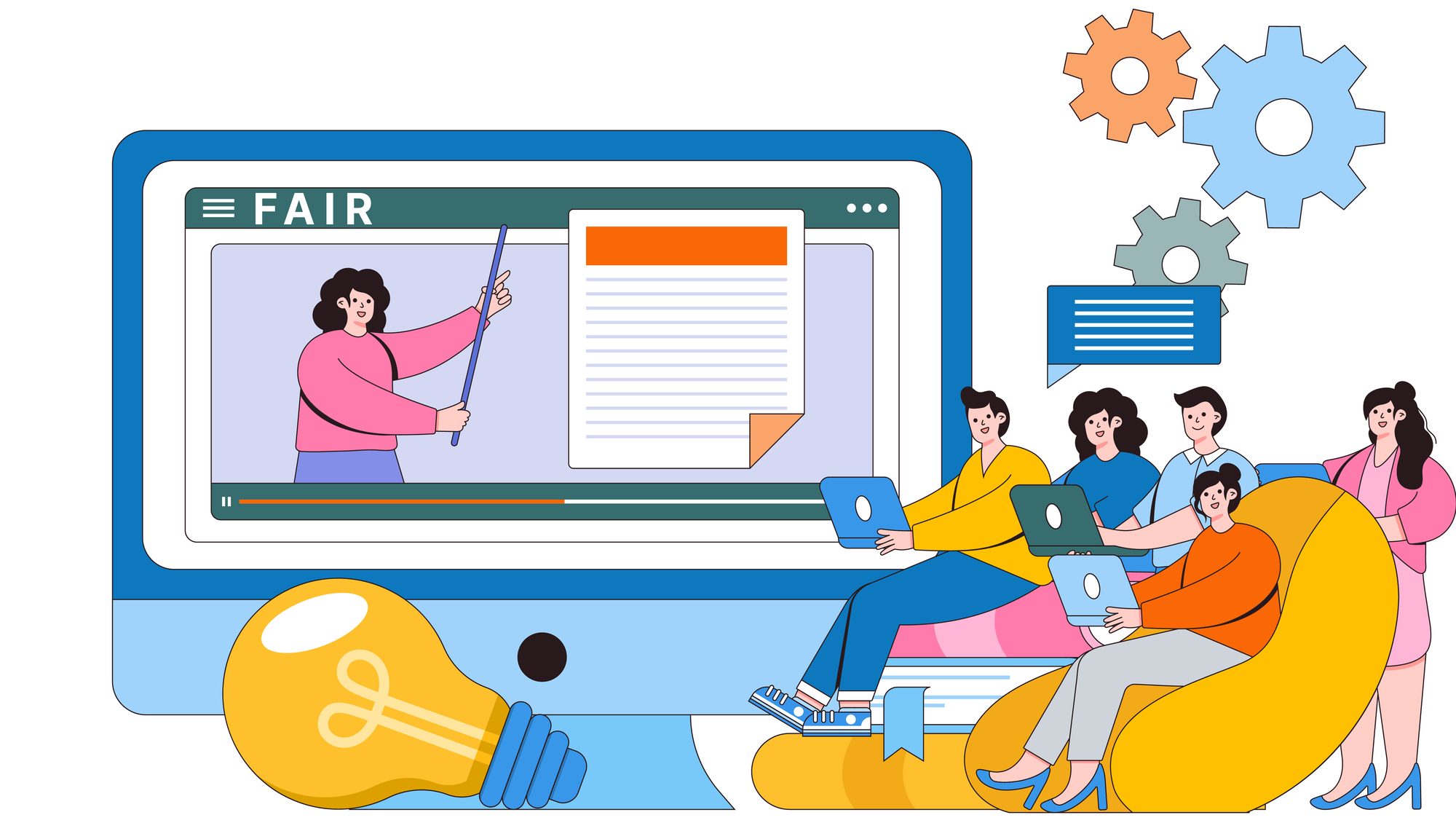5.3 Supporting FAIR within your designated communities
While Section 5.2 addressed ways that organisations can enable FAIR internally, this section focuses on the role of a data archive in educating their designated communities on FAIR principles. There is not one approach that fits every archive, but rather you should determine what makes sense for your archive and your designated community. We will introduce the different perspectives as well as give some examples from CESSDA Service Providers.

5.3.1 Promoting and embedding FAIR
Archives are service providers and it is up to each archive how much external education and training they want (or are able) to provide to their designated community. This can include promoting the FAIR principles to users, achieved with guides, training, tools, or news bulletins. An archive can also decide to focus on embedding the necessary elements related to FAIR principles within their organisation.
For example on promoting FAIR, The Dutch Service Provider DANS links to their Preservation Plan that is provided to users before and during the process of depositing data. In section 10, the Preservation Plan clearly references FAIR Principles and the various workflows and services that the repository provides to users to achieve this.
Archives that focus on embedding information about the implementation of the FAIR principles to users often do so to make the process as seamless as possible. Users will be prompted to provide metadata, use controlled vocabularies, and choose licences, but the relationship with FAIR is not made explicit. This can be seen, for example, in the Social Sciences and Digital Humanities Archive (SODHA) of Belgium, where their user guide focuses more on the steps necessary for depositing data - FAIR comes into play throughout the guide, but the term isn’t mentioned explicitly.
5.3.2 Examples within the CESSDA community
Below are a selection of examples of different materials on FAIR that CESSDA Service Providers offer to their designated community.
Providing designated community with essentials like FAQs or guides
Guides that are produced and maintained by an archive, such as the SODHA guide, are the most specific to their designated community. This sampling gives an overview of the different ways that Service Providers maintain and present their own guides and services, including a tool that we’ve previously mentioned, FAIR-Aware.
|
Linking to external guides
If your archive doesn’t immediately have the resources or the desire to create their own guides for users related to FAIR principles, that is no problem, as there are a number of existing guides that can be used. In addition to this guide, CESSDA also creates and maintains the Data Management Expert Guide (DMEG), which is aimed at social scientists and archive users.
And while the DMEG is an invaluable resource, it’s understandable that archives want to provide information in the language most likely to be used by their users, or to coordinate with other national organisations. This is where linking to external guides can be extremely beneficial, saving time and resources. For instance, the Danish National Archive (DNA) links to courses on research data management from the national organisation Danish e-infrastructure Cooperation (DeiC).
Host or participate in events
If your organisation has established webinars or events, these are perfect opportunities to invite external FAIR experts or apply your own knowledge to promote it to your designated community. If you cannot host an event yourself, there are likely opportunities to participate in similar series and promote them to your designated community as well (such as those from CESSDA).
|
Here are some examples of events or participation in events by CESSDA Service Providers related to FAIR principles:
|
Events that cover FAIR and Open Science are a good opportunity to introduce these principles to your designated community as part of your community outreach. Many European countries have a National Open Access Desk (NOAD), which supports Open and FAIR research output through for instance national events. Find out more about your NOAD contact.
Communication directly with designated users
News updates, blog posts, and newsletters can be a useful and low-threshold method of communicating directly with your designated community, such as by sharing internal FAIR initiatives or linking to (external) information on FAIR practices. For example, we already discussed how the FSD used the Fair Maturity Evaluation assessment tool - this use was also communicated with their community widely through a news post.
Increase your understanding
Find out more about your archiveWe’ve discussed the ways that archives can promote or embed FAIR - investigate what the situation is at your archive:
|
Expert tips
In addition to the tools we have discussed here, you can head to FAIRassist.org and scroll through some more of the FAIR tools and resources available - maybe there is something that we haven’t covered here that looks promising to promote to your users?